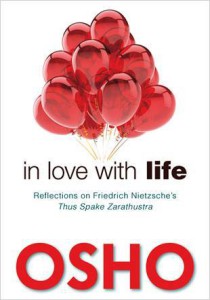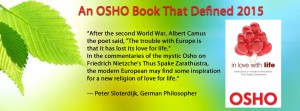
About Friedrich Nietzsche: In Love with Life
FRIEDRICH NIETZSCHE is perhaps the greatest philosopher the world has known. He is also great in another dimension which many philosophers are simply unaware of: he is a born mystic.
His philosophy is not only of the mind but is rooted deep in the heart, and some roots even reach to his very being. The only thing unfortunate about him is that he was born in the West; hence, he could never come across any mystery school. He contemplated deeply, but he was absolutely unaware about meditation. His thoughts sometimes have the depth of a meditator, sometimes the flight of a Gautam Buddha; but these things seem to have happened spontaneously to him.
He knew nothing about the ways of enlightenment, about the path that reaches to one’s own being. This created a tremendous turmoil in his being. His dreams go as high as the stars but his life remained very ordinary – it does not have the aura that meditation creates. His thoughts are not his blood, his bones, his marrow. They are beautiful, immensely beautiful, but something is missing; and what is missing is life itself. They are dead words; they don’t breathe – there is no heartbeat.
A few Fragments that are helpful in Spiritual Growth
But I have chosen to speak on him for a special reason: he is the only philosopher, from East or West, who has at least thought of the heights of human consciousness. He may not have experienced them; he certainly has not experienced them. He also thought of becoming a man again. That idea, of descending from your heights into the marketplace, descending from the stars to the earth, has never happened to anybody else.
He has something of Gautam Buddha, perhaps unconsciously carried over from his past lives, and he has something of the Zorba. Both are incomplete. But he is the only proof that Buddha and Zorba can meet; that those who have reached to the highest peaks need not remain there.
In fact, they should not remain there. They owe something to humanity; they owe something to the earth. They have been born amongst human beings; they have lived in the same darkness and in the same misery. And now that they have seen the light, it becomes obligatory that they should come back to wake up those who are fast asleep; to bring the good news – that darkness is not all, that unconsciousness is our choice.
If we choose to be conscious, all unconsciousness and all darkness can disappear. It is our choice that we are living in the dark valleys. If we decide to live on the sunlit peaks, nobody can prevent us because that is also our potential.
But the people who have reached to the sunlit peaks completely forget about the world they are coming from. Gautam Buddha never descended. Mahavira never descended. Even if they have made efforts for humanity to wake up, they have shouted from their sunlit peaks.
Man is so Deaf, so Blind…
Man is so deaf, so blind that it is almost impossible for him to understand people who are talking from higher stages of consciousness. He hears the noise but it does not bring any meaning to him.
Nietzsche is unique in this sense. He could have remained an extraordinary, very superhuman philosopher, but he never forgets for a single moment the ordinary human being. It is his greatness. Although he has not touched the highest peaks, and he has not known the greatest mysteries, whatsoever he has known, he is longing to share with his fellow human beings. His desire to share is tremendous.
I have chosen to speak on a few fragments which may be helpful to you, for your spiritual growth.
Reflections on Friedrich Nietzsche’s Thus Spake Zarathustra
Het boek ‘In Love with Life’ is door een Duitse filosoof uitgeroepen als ‘Het boek van 2015′. Via het boek maak je een prachtige reis door een wereld waarin ’t leven gevierd wordt en waar tijdloze waarheid boven leugens en verdraaiingen  gaat die belemmeren dat we gezond en heel worden. In 10 hoofdstukken wordt de visie van Nietzsche ontdaan van alle misverstanden hieromtrent en de mystieke dimensie ervan onthuld.
gaat die belemmeren dat we gezond en heel worden. In 10 hoofdstukken wordt de visie van Nietzsche ontdaan van alle misverstanden hieromtrent en de mystieke dimensie ervan onthuld.
Osho heeft verschillende lezingen series aan Nietzsche gewijd. Deze filosoof is in zijn tijd in zijn omgeving, het westen, niet begrepen. Waarschijnlijk kan alleen een eigentijdse mysticus als Osho Nietzsche echt begrijpen. in het boek ‘In love with Life’ deelt Osho zowel zijn inzicht in de mens die Nietzsche is als zijn baanbrekende werk.
Nietzsche schrijft in Ecco homo, Zie de mens, dat hij met “aldus sprak Zarathustra” het grootste geschenk aan de mensheid gegeven heeft dat tot dan toe maar mogelijk was. Door dit boek overbrugt Nietzsche de eeuwen omdat hij de spreekbuis van de revolutionaire Perzische mysticus Zarathustra wordt.
Een van de uitspraken van Nietzsche Is: “God is dead…now man is free.” Deze niet begrepen uitspraak van Nietzsche wil zeggen, dat we geen marionetten (meer) zijn. We zijn vrij om het leven vanuit ons eigen bewustzijn in te richten en te vieren. Nietzsche geeft hiermee aan, aldus Osho, intens van het leven te houden en het daarom alleszins waardig te vinden om dit te vieren.
De hedendaagse Duitse filosoof Peter Sloterdijk heeft het Osho boek ‘In Love with Life’ daarom uitgeroepen tot het boek dat het jaar 2015 bepaalde. Hij geeft aan:
“Na de tweede Wereldoorlog zei de dichter Albert Camus: “Het probleem met Europa is dat het zijn liefde voor het leven kwijtgeraakt is.”
In de commentaren van de mysticus Osho op Friedrich  Nietzsche’s ‘Zo Sprak Zarathustra’ kan de moderne Europeaan enige inspiratie voor een nieuwe religie van liefde voor het leven vinden.”
Nietzsche’s ‘Zo Sprak Zarathustra’ kan de moderne Europeaan enige inspiratie voor een nieuwe religie van liefde voor het leven vinden.”
Peter Sloterdijk, Duits Filosoof
Het boek In Love with Life is verkrijgbaar bij de Boekhandel en via internet.
Impressie van In Love with Life
Perhaps only a contemporary mystic like Osho could truly understand a Western philosopher and mystic like Nietzsche. In Love with Life Osho shares his understanding of both Nietzsche the man and of his seminal work, with extraordinary clarity and relevance.
The result is an enchanting journey through a world where life is celebrated, not renounced, and where timeless truths prevail over the lies and distortions that continue to cripple our efforts to become healthy and whole.
In ten selected chapters Nietzsche is rescued from any misunderstanding and appropriation of his work, and Osho adds dimensions to his work.
“I have chosen to speak on a few fragments which may be helpful to you, for your spiritual growth.” – Osho
In his preface to Ecce Homo, Friedrich Nietzsche says: “With [Thus Spoke Zarathustra] I have given mankind the greatest present that has ever been made to it so far. This book, with a voice bridging centuries, is not only the highest book there is, the book that is truly characterized by the air of the heights — the whole fact of man lies beneath it at a tremendous distance — it is also the deepest, born out of the innermost wealth of truth, an inexhaustible well to which no pail descends without coming up again filled with gold and goodness.” Here, the reader learns much about the mysterious and revolutionary Persian mystic Zarathustra (Zoroaster), whom Nietzsche chose as a spokesperson.